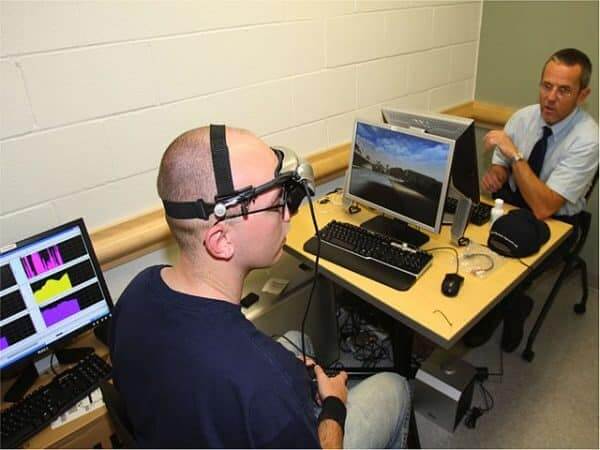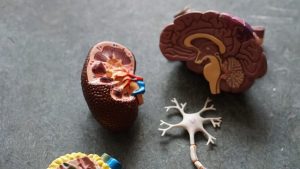
In many addiction treatment programs, the detox stage uses medication to help minimize withdrawal symptoms, some of which are lethal. However, there is an alternative holistic treatment for co-occurring disorders and addiction that doesn’t involve the use of drugs, and that is biofeedback therapy.
What Happens During Biofeedback Therapy?
By Medical News Today’s definition, biofeedback is a non-drug form of therapy that helps people control certain bodily functions, usually involuntary, like their heart rate, muscle tension, and blood pressure.
During therapy sessions, the person is connected to a machine with electrical sensors. These sensors are placed on the patient’s skin to measure reactions to mental and physical exercises led by a therapist.

The feedback from the sensors helps the patient make subtle adjustments in their body (e.g., relaxing muscles) to achieve particular results (e.g., lessen pain).
In a nutshell, biofeedback allows people to practice new ways to control their body and how it responds to improve their health.
This type of non-drug therapeutic method can be used to help treat various disorders. Some of these disorders include ADHD, anxiety, chronic pain, sleeping disorders, and addiction.
How Can Biofeedback Therapy Treat Addiction?
When it comes to addiction recovery, biofeedback essentially allows patients to gain control over their mind and body.
The feedback is relayed back to the patient through light flashes, images, or sounds. The information will then help them with relaxation exercises to control their body’s response to stressful events like cravings and withdrawals.
Biofeedback machines for addiction treatment track and record the patient’s bodily functions and show them back to them. For example, their heart rate might look like pulsing lights or images on the monitor.
If it pulses quickly, the patient would know that they need to use de-stressing techniques to lower their heart rate. If the pulsing lights or images slow down, it means the heart rate has too.

With this information, recovering addicts can understand their involuntary functions and employ methods to keep on the right track. On the same note, medical professionals can use it to create a tailored plan specific to the patient’s needs.
Neurofeedback Therapy and Addiction
There are several types of biofeedback therapy, but neurofeedback is specifically used to treat addiction and substance abuse.
With an electroencephalograph (EEG), neurofeedback uses scalp sensors to monitor brain waves. Neurofeedback, also known as EEG feedback, is a way to deal with brain dysregulation problems by learning to train the brain.
This process is essentially observing the brain in action. With the data received, you can “reward” the brain when it changes its activity and patterns for a better result.
Neurotherapy for Substance Abuse
Several studies on EEG biofeedback have shown it as an effective method in treating such disorders as attention deficit hyperactivity disorder (ADHD), anxiety, depression, posttraumatic stress disorder (PTSD), autism spectrum disorders, and substance use disorders (SUDs).
This type of biofeedback therapy promotes neuroplasticity by helping the patient modify brainwave patterns and change specific neural functioning.
EEG therapy can be a part of a large treatment program. When combined with other forms of therapy like psychotherapy, it can prove helpful in treating SUDs, no matter the substance.

A 2013 study that involved 20 opiate-addicted patients found that when Neurotherapy is added to their regular treatment, they reported fewer withdrawal cravings and less desire to take opioids. Additionally, the patients’ had significant improvements in mental health, specifically in terms of depression and anxiety.
Neurofeedback is an excellent form of therapy for recovering addicts. This is because abusing drugs and alcohol can significantly alter brain activity and functionality. It can help steer the brainwave patterns in activating its reward system to respond to the positive changes instead of the presence of drugs.
However, one should note that because different substances have different effects on the brain, neurofeedback therapy will also work slightly differently depending on the substance.
Withdrawals and Biofeedback for Addiction Therapy
There are two ways the nervous system controls bodily functions: voluntary and involuntary. Voluntary actions are those done with the individual’s conscious will (closing your eyes). On the other hand, people don’t really have control over involuntary actions (blushing).
Involuntary functions can make an individual more distressed when they’re under severe emotional stress, are very tense, or nervous. Cravings and withdrawal symptoms can do those to a recovering addict.
Biofeedback can also treat common drug and alcohol withdrawal symptoms, like depression, anxiety, restlessness, and chronic muscle pain.
Biofeedback therapy monitors how the patient’s body unconsciously reacts to emotional and physical tension from the therapist’s guided exercises.
Specifically, biofeedback tracks involuntary functions such as:
- Heart rate
- Breathing rate
- Blood pressure
- Temperature
- Muscle contract
Exercises In Biofeedback Therapy For Addiction Treatment
To gauge a patient’s involuntary responses, a medical professional– most likely a therapist– will guide them through a series of physical and mental exercises.
Mindfulness Meditation
Mindfulness meditation focuses on the individual using peaceful concentration to release negative thoughts and emotions.
Progressive Muscle Reaction
In a progressive muscle reaction exercise, the individual focuses on releasing tightness from their muscles one muscle group at a time.
Guided Imagery
Guided imagery directs the individual to steer their thoughts toward soothing and positive images and scenarios to relax their body and mind.
If you or anyone you know feels the need to break free from addiction in LA, turn to Restore Health & Wellness Center. You can visit us at 6918 Owensmouth Ave, Canoga Park, CA 91303, contact us at 888-979-4570, or visit our website here.





